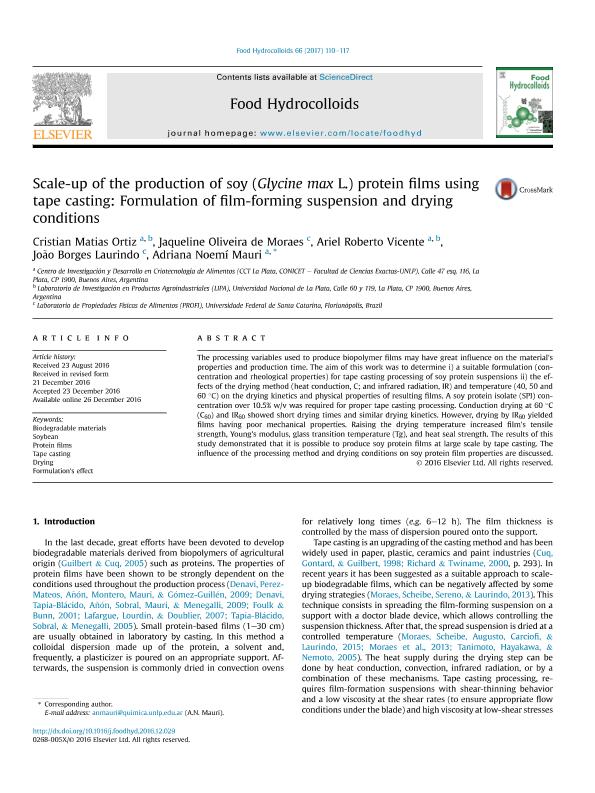Artículo
Scale-up of the production of soy (Glycine max L.) protein films using tape casting: Formulation of film-forming suspension and drying conditions
Ortiz, Cristian Matias ; Moraes, Jaqueline Oliveira de; Vicente, Ariel Roberto
; Moraes, Jaqueline Oliveira de; Vicente, Ariel Roberto ; Laurindo, João Borges; Mauri, Adriana Noemi
; Laurindo, João Borges; Mauri, Adriana Noemi
 ; Moraes, Jaqueline Oliveira de; Vicente, Ariel Roberto
; Moraes, Jaqueline Oliveira de; Vicente, Ariel Roberto ; Laurindo, João Borges; Mauri, Adriana Noemi
; Laurindo, João Borges; Mauri, Adriana Noemi
Fecha de publicación:
05/2017
Editorial:
Elsevier
Revista:
Food Hydrocolloids
ISSN:
0268-005X
Idioma:
Inglés
Tipo de recurso:
Artículo publicado
Clasificación temática:
Resumen
The processing variables used to produce biopolymer films may have great influence on the material's properties and production time. The aim of this work was to determine i) a suitable formulation (concentration and rheological properties) for tape casting processing of soy protein suspensions ii) the effects of the drying method (heat conduction, C; and infrared radiation, IR) and temperature (40, 50 and 60 °C) on the drying kinetics and physical properties of resulting films. A soy protein isolate (SPI) concentration over 10.5% w/v was required for proper tape casting processing. Conduction drying at 60 °C (C60) and IR60 showed short drying times and similar drying kinetics. However, drying by IR60 yielded films having poor mechanical properties. Raising the drying temperature increased film's tensile strength, Young's modulus, glass transition temperature (Tg), and heat seal strength. The results of this study demonstrated that it is possible to produce soy protein films at large scale by tape casting. The influence of the processing method and drying conditions on soy protein film properties are discussed.
Archivos asociados
Licencia
Identificadores
Colecciones
Articulos(CIDCA)
Articulos de CENTRO DE INV EN CRIOTECNOLOGIA DE ALIMENTOS (I)
Articulos de CENTRO DE INV EN CRIOTECNOLOGIA DE ALIMENTOS (I)
Citación
Ortiz, Cristian Matias; Moraes, Jaqueline Oliveira de; Vicente, Ariel Roberto; Laurindo, João Borges; Mauri, Adriana Noemi; Scale-up of the production of soy (Glycine max L.) protein films using tape casting: Formulation of film-forming suspension and drying conditions; Elsevier; Food Hydrocolloids; 66; 5-2017; 110-117
Compartir
Altmétricas



